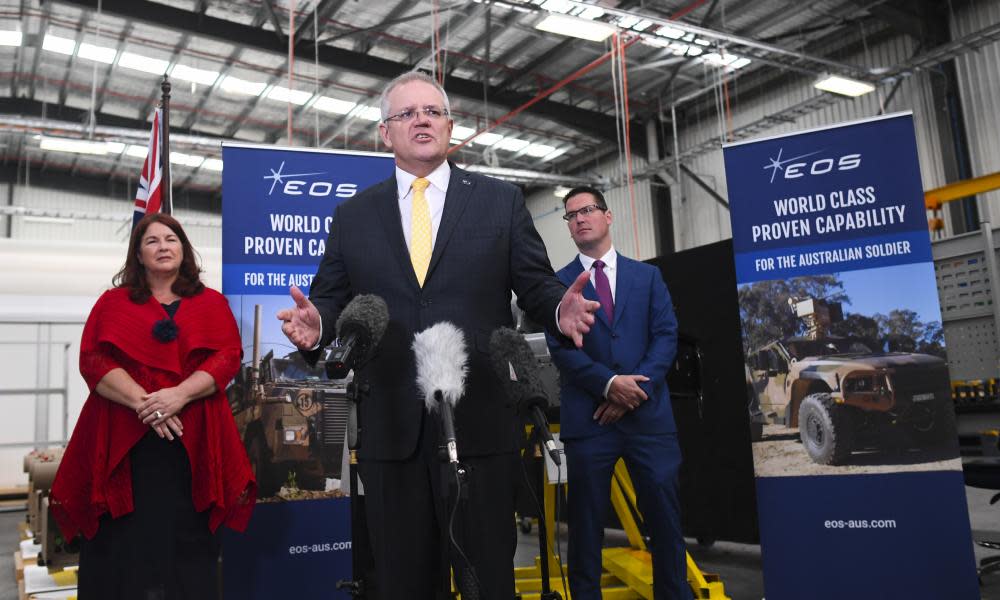Unions say Coalition's 'demonising' of unemployed is groundwork for Covid-19 welfare cuts

Australian unions have labelled it “cruel” of the government to suggest the unemployed are unwilling to work given the dearth of vacancies, record rates of unemployment and underutilisation among young people.
The Australian Council of Trade Unions president, Michele O’Neil, made the comments to Guardian Australia on Thursday, warning that “demonising young people … based on anecdotal stories” is laying the groundwork for cuts to jobkeeper wage subsidies and jobseeker unemployment benefits.
On Tuesday the government released data from the National Skills Commission which The Australian newspaper claimed showed unemployed people were opting for the dole over work.
A Guardian Australia analysis showed the claim of a lack of applications was based on responses from only about 70 employers out of the 2,324 surveyed. This was the reason cited by roughly half of the approximately 140 employers who were having – or expected to have – difficulty in their current attempts to recruit staff.
Employers have also been flooded with job applications, according to classified website Seek.
Employment minister Michaelia Cash has urged jobseekers to “start to re-engage with the job market”, while Scott Morrison has said that some businesses are “finding it hard to get people to come and take the shifts” because of the government’s decision to double jobseeker to $1,100 a fortnight.
The intervention comes as the government considers whether to grant a permanent increase to jobseeker and the future of jobkeeper wage subsidies, worth $1,500 a fortnight.
O’Neil said that 37.8% of people aged 15 to 24 “are either out of work or need more hours of work”.
“That’s the absolute highest [underutilisation] rate we’ve had since Australian Bureau of Statistics started tracking this in 1978.”
“This combines with youth unemployment itself being at its highest point since 1997, and we’ve got 750,000 workers employed with no hours of work.”
O’Neil said there is “roughly one job [vacancy] for every 12 people looking for a job”.
“So it’s very concerning to see the government demonising unemployed people and resorting to very tired arguments based on anecdotal stories rather than the facts.”
“It’s cruel … It seems to me that there’s no basis to be demonising unemployed people other than the government trying to soften the ground to reduce their conditions.”
In addition to the debate over jobseeker, Liberal MPs including Warren Entsch and Craig Kelly have warned the $1,500 fortnightly jobkeeper payment had caused workers to refuse shifts and called for a new condition requiring employees to return to work if they receive it.
Related: Australian job loss tracker: the industries and places most affected by the coronavirus crisis
The ABS has found that some 20% of workers earn more under jobkeeper than their pre-coronavirus pay, prompting Labor to call for the Coalition to consider trimming the payment.
O’Neil rejected the argument this group was overpaid, explaining jobkeeper is “a supplement to low-income households” who are under financial stress, such as 200,000 people who have been forced to move home during the Covid-19 contraction.
“Any additional income is needed and quickly recirculates in the economy, because they spend every cent that comes in,” she said, citing the fact young people and women are the biggest beneficiaries.
Jobseekers have told Guardian Australia the coronavirus supplement is vital to cover expenses including rent. Tess Cullity said she is “applying for anything I can get” because “any job is a good idea” and expressed concern that payments could be cut if she didn’t complete “compulsory activities” such as storytime at the library.
“What does that have to do with my ability to find a job?”
O’Neil accused the government of having “no plan” to create jobs.
Morrison has announced a series of ideas short of fully-formed policies to boost employment, such as adding conditions to skills funding and convening industrial relations roundtables between employers and unions, and brought forward some infrastructure spending.
O’Neil said these policies were “thought-bubbles” that didn’t address the fact the recession is having a disproportionate impact on women, who have lost the majority of jobs, and do nothing to boost employment in community services, healthcare, aged care, retail and tourism.
“Couple that with the fact they have a policy to remove free childcare – which is going to hit women the hardest.”
Related: Joining the job queue: 'I feel increasing fear and desperation'
The small business ombudsman, Kate Carnell, has also argued the end of free childcare on 13 July will make it harder for women to re-enter the workforce.
Carnell told Guardian Australia she had received “huge amounts of feedback” from small business owners and managers who needed to access childcare – but in a lot of these cases they were still reliant on the jobkeeper wage subsidy.
“And it’s pretty hard to work out how you’ll pay childcare even if you get an 85% subsidy – you’re still looking at money you don’t have if you’re only on $750 a week, and tax will come out of that of course,” she said.
“If you’re on jobkeeper you just can’t afford it – and we really really really need these people to be back in the workforce, getting their businesses up and running.”
Carnell called on the government to take up the Grattan Institute’s proposal to increase the childcare subsidy to 95% of the childcare costs for low-income families, tapering down slowly as family income increases. She said beneficiaries of the higher subsidy should include jobkeeper recipients.
“We’re not going to increase productivity if we can’t get the female participation rate back up and we won’t do that if childcare isn’t affordable,” Carnell said.

 Yahoo News
Yahoo News 
